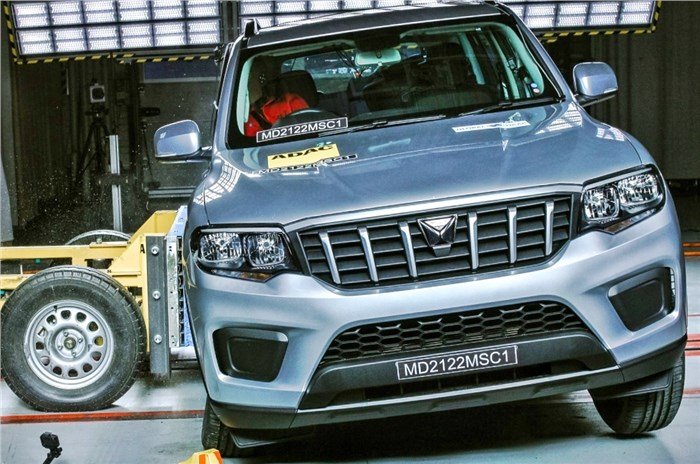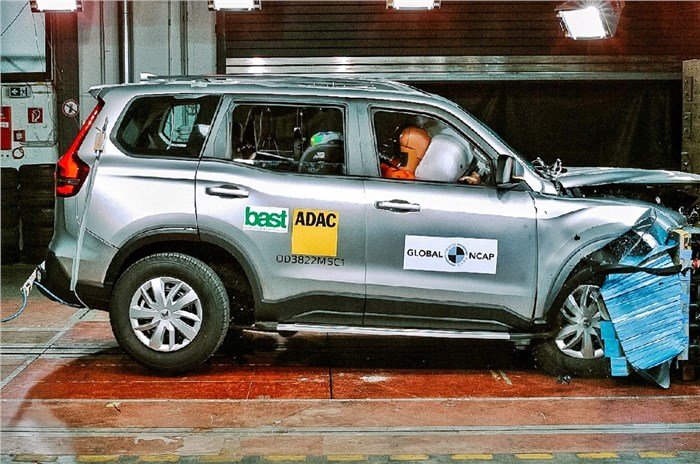The new Mahindra Scorpio N has achieved an encouraging five star rating for both adult occupants in Global NCAP’s new round of #SaferCarsForIndia crash tests. The Mahindra Scorpio-N was assessed in its most basic safety specification fitted with two frontal airbags and ABS. Electronic Stability Control (ESC) and side curtain airbags are not standard however curtain airbags are standard in the majority of units produced. The lack of three point seatbelts affected the child occupant protection result, limiting it to only three stars.
The second set of results complying with Global NCAP’s new and more demanding crash test protocols were published in the #SaferCarsforIndia campaign today, supported by the FIA Foundation and Bloomberg Philanthropies.
The Mahindra Scorpio-N has scored five stars for adult occupant protection and three stars for child occupant protection. The new Mahindra Scorpio N comes with safety features like six airbags, front and rear camera, front and rear parking sensors, traction control, hill hold control, and hill descent control. Electronic Stability Control, Roll-Over mitigation, Brake Disc Wiping and Brake Prefill, tyre pressure monitoring system and driver drowsiness warning system.


Mahindra Scorpio N: Adult occupant safety
The protection offered to the driver’s and passenger’s head and neck was good. Driver’s and passenger’s chest showed marginal protection. Driver’s and passenger’s knees showed good protection. Driver’s tibias showed adequate protection and passenger’s tibias showed adequate and marginal protrection. Footwell area was rated as stable. The bodyshell was rated as stable and is capable of withstanding further loadings.
The head, chest, abdomen and pelvis was good protected in a good manner. Curtain airbags of the Mahindra Scorpio N met the fitment requirements and pole impact test was performed in a version with side head protection airbags, showing good protection to the head, abdomen and pelvis, and weak protection to the chest.


Electronic Stability Control (ESC) of the Scorpio N met the fitment rate requirements and the performance shown in the test was acceptable according to Global NCAP’s latest requirements. The bodyshell and the footwell area of the Scorpio N were stable, with the latter capable of withstanding further loadings.
Mahindra Scorpio N: Child Occupant Safety
The child seat for the 3 year old was installed rearward facing using the i-size anchorages and a support leg and it was able to prevent head exposure during the frontal impact offering full protection. The child seat for the 18 month old was installed rearward facing using the i-size anchorages and a support leg and it was able to prevent head exposure during the frontal impact offering full protection.
Both CRS’s offered full side impact protection during the side impact test. The Scorpio N does not offers 3 point belts in all seating positions. The car offers the possibility to disconnect the passenger airbag in case a rearward facing CRS will be installed in this position. Most of the CRS installation passed for the assesed CRS.
“Indian manufacturers such as Mahindra have clearly demonstrated their ongoing commitment to improving vehicle safety performance. This is very welcome and we look forward to this promising momentum being maintained when Bharat NCAP is launched next year.
Saul Billingsley, Executive Director of FIA Foundation
GNCAP new testing protocols
Under the new Global NCAP protocols, a vehicle is given a 5-star rating only if it secures the required scores while also conforming to the ESC, pedestrian protection, pole side impact and seat belt reminder requirements of GNCAP.
It also becomes a bit difficult to compare vehicles tested under the old protocols with vehicles tested under the new ones, as the entire process has been overhauled. A star rating under the old protocols is reflective of performance in a front crash test, however, a star rating under the new protocols is reflective of more rounded protection that takes into account side impact as well as active safety like ESC, which helps prevent an accident in the first place.


